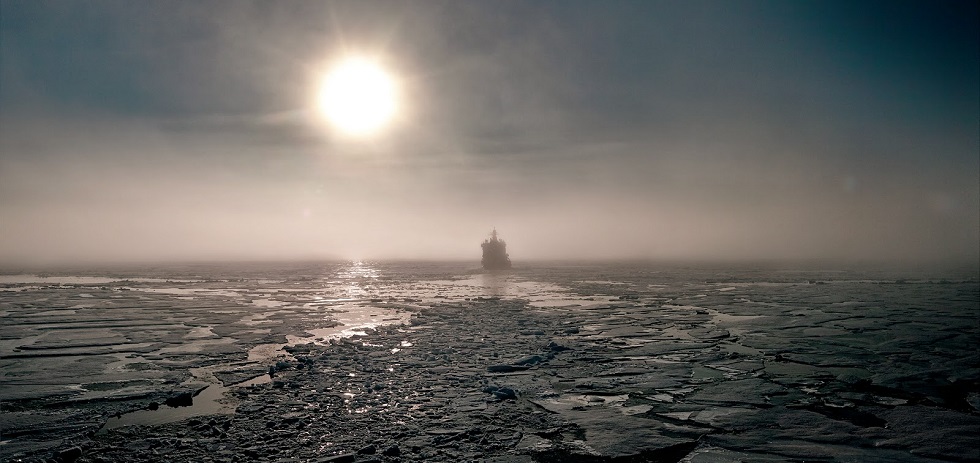Exotica, Erotica, Etc. is an unconventional film, sitting somewhere between documentary, biography, and tone poem. Photographic artist Evangelia Kranioti’s debut feature film sees a Chilean sex-worker recount past tales of love and lust, reminiscing about her time spent with the sailors that would stop in her smaller village. Superimposed over her monologue are vignettes of the sea; the ice cracking under the force of cargo vessels, the sun as it sets and rises, waves washing over the bough of gigantic majestic crafts – it’s some truly beautiful imagery, and while Kranioti’s film never fully lives up to its conceit, failing to ever truly coalesce, it’s still a moving cinematographic showcase.
Exotica, Erotica, Etc. is a loose reimagining of The Odyssey, filtered through the perspective of Sandy (and, on occasion, un-named cargoship workers), an older sex-worker who fell in love with many of the exotic, foreign sailors who docked in her small cargo town – a tale that is apparently all to regular within the women of the community.1 Juxtaposed over a long-form poem that vacillates in-and-out of the film is a wealth of amazing imagery of the coastline, the community, the brothels, and – of course – the sailors, their ships, their cargo, and the sea. It is in Kranioti’s imagery that the film succeeds, with the high-falutin concept bringing with it some serious narrative inconsistency.
In one sense, Kranioti’s film acts almost as an anti-documentary, rallying against traditional storytelling and failing to inform or teach, instead attempting to conjure a consistent tone and recount lived experience. It definitely walks a fine line of categorisation, with its dramatized poetry recounts and lack of exploratory research. At its best, this approach can lead to interesting territory such as that covered in the impressive Episode of the Sea, which uses narratives of the Urkish fishing tradition in decline to talk about the death of celluloid, ritual and tradition; at its worst, we get a YouTube collage of generic landscape shots and pretentious dialogue. Although Erotica, Exotica, Etc. never approaches the heights of Episode of the Sea, Kranioti’s sense of mise-en-scene cannot be faulted, and while Kranioti’s film feels directionless at times, it never quite falls into the trap of mining the endless, pointless nothingness, always mining something fresh and interesting out of her 18-month stint travelling with and documenting the lives of the sailors herein.
It does have to be said that there’s something that doesn’t sit right in Kranioti’s extended metaphor of sex workers as a feminine-force seeking love in their life and finding it in their clientele, with the masculine clientele herein are all connected to manual labour and lack emotion. Although obviously not the intent of the director, it did sometimes act to unintentionally demean her female subjects as a purely emotional force, crazy with love for the exotic men of the sea that seems to undermine her overall sex-positive, humanising (yet muddled) message. To weave a visual poem centring on the exploitation of sex-workers who are unable to remove love from the equation of their work reinforces all of the worst misguided moralistic rhetoric surrounding the profession, reinforcing the “hooker with a heart of gold” trope that spawned some of the worst cinema of the 20th century and the brilliant Leaving Las Vegas. However, it’s hard to criticise in this case as the rhetoric is coming from somebody who is telling their own, personal story, although the tale does feel somewhat doctored to shoehorn it into the external trappings of The Odyssey.
All in all, while never fully successful, there’s minor strokes of brilliance, mainly bursting from Kranioti’s cinematography that make Erotica, Exotica, Etc. worthy of attention. It’s not going to be for everyone, but for some it will work wonders, enrapturing them in the tales of love, lust, and the sea with enough aesthetic beauty to more than make up for its shortcomings.

